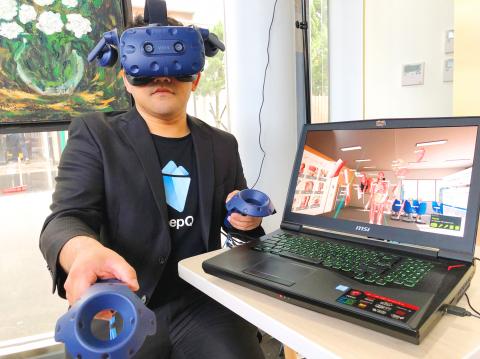Smartphone maker HTC Corp (宏達電) has set its sights on earning an operating license from the Food and Drug Administration to commercialize a new medical virtual-reality (VR) product in the first quarter of next year.
Dubbed Surgical Theater, the VR product could begin to be adopted in clinical use and provide HTC with new revenue streams from the healthcare sector, the company said at a news conference yesterday.
The company also announced that it has sold Taipei Medical University its latest VR offering, 3D Organon, a bundle of 10 Vive Pro VR headsets that provide visualized anatomy information for education.

Photo by Kao Shih-ching, taipei Times
Medical students usually learn human anatomy from 2D models and diagrams in textbooks, or from donated cadavers, which are often in short supply, university Department of Anatomy professor Chang Hung-ming (張宏名) told the Taipei Times.
With the VR teaching system, students can see a computerized simulation that more clearly depicts human anatomy, especially the nervous system, whose components are thin and mostly hidden behind muscles and cavities, Chang said.
A 360o view allows users to see the human body from all angles to better understand how everything is connected, and they can also peel back layers or isolate 4,000 body parts to have a specific view, HTC healthcare division DeepQ director Jerry Cheng (鄭志偉) said.
“Users can even go through the virtual body to have a clear look inside at parts such as the spine and cavities,” he said.
However, it is hard for a VR system to substitute for “silent teachers” (大體老師) — people who have donated their bodies to medical schools — as “students cannot touch or feel the elasticity of muscles in virtual reality,” Chang said.
Besides Taipei Medical University, HTC has also sold 3D Organon to Tri-Service General Hospital and Taipei Municipal Wanfang Hospital, which plan to use the product for shared decisionmaking with patients, Cheng said.
While the firm has begun marketing 3D Organon, which costs about NT$100,000 per unit, HTC said it has also applied for a license for Surgical Theater, which would cost significantly more.
The company has received three medical appliance licenses from the US Food and Drug Administration for Surgical Theater, which provides accurate information that can even be used to help surgeons navigate operations, Cheng said.
As HTC has already conducted clinical trials in the US, it expects to receive approval from the Taiwanese agency by the first quarter of next year, Cheng said, adding that it would market the product to domestic hospitals first and expects to see revenue from the healthcare sector soar.

Sweeping policy changes under US Secretary of Health and Human Services Robert F. Kennedy Jr are having a chilling effect on vaccine makers as anti-vaccine rhetoric has turned into concrete changes in inoculation schedules and recommendations, investors and executives said. The administration of US President Donald Trump has in the past year upended vaccine recommendations, with the country last month ending its longstanding guidance that all children receive inoculations against flu, hepatitis A and other diseases. The unprecedented changes have led to diminished vaccine usage, hurt the investment case for some biotechs, and created a drag that would likely dent revenues and

Global semiconductor stocks advanced yesterday, as comments by Nvidia Corp chief executive officer Jensen Huang (黃仁勳) at Davos, Switzerland, helped reinforce investor enthusiasm for artificial intelligence (AI). Samsung Electronics Co gained as much as 5 percent to an all-time high, helping drive South Korea’s benchmark KOSPI above 5,000 for the first time. That came after the Philadelphia Semiconductor Index rose more than 3 percent to a fresh record on Wednesday, with a boost from Nvidia. The gains came amid broad risk-on trade after US President Donald Trump withdrew his threat of tariffs on some European nations over backing for Greenland. Huang further

CULPRITS: Factors that affected the slip included falling global crude oil prices, wait-and-see consumer attitudes due to US tariffs and a different Lunar New Year holiday schedule Taiwan’s retail sales ended a nine-year growth streak last year, slipping 0.2 percent from a year earlier as uncertainty over US tariff policies affected demand for durable goods, data released on Friday by the Ministry of Economic Affairs showed. Last year’s retail sales totaled NT$4.84 trillion (US$153.27 billion), down about NT$9.5 billion, or 0.2 percent, from 2024. Despite the decline, the figure was still the second-highest annual sales total on record. Ministry statistics department deputy head Chen Yu-fang (陳玉芳) said sales of cars, motorcycles and related products, which accounted for 17.4 percent of total retail rales last year, fell NT$68.1 billion, or

Macronix International Co (旺宏), the world’s biggest NOR flash memory supplier, yesterday said it would spend NT$22 billion (US$699.1 million) on capacity expansion this year to increase its production of mid-to-low-density memory chips as the world’s major memorychip suppliers are phasing out the market. The company said its planned capital expenditures are about 11 times higher than the NT$1.8 billion it spent on new facilities and equipment last year. A majority of this year’s outlay would be allocated to step up capacity of multi-level cell (MLC) NAND flash memory chips, which are used in embedded multimedia cards (eMMC), a managed